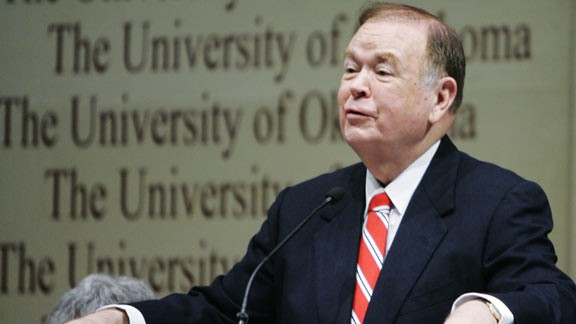David Boren, President of The University of Oklahoma stirred the pot on realignment by reiterating his stance that the Big 12 should expand to twelve teams. He also criticized Texas for the Longhorn Network without specifically mentioning it by name. College administrators have stirred this pot in the past by commenting (1) on conference realignment, which caused conference bloggers (myself included) to speculate on future expansion.
In the past comments from Power-Five administrators have only given obvious answers along the lines of “we are watching the current landscape and will add schools if the time is right.” Or Group of Five (G5) administrators trying to talk their way into a P5 conference by stating how they would be a good fit for (insert conference name). What we typically see are answers that don’t generate any new information on the subject of conference realignment. Instead they restate the obvious by telling us information that we already could have assumed as accurate simply by filling in the blanks ourselves.
This time things are different. What makes Boren’s comments so different from previous cases is that he mentioned a critical detail that was previously unknown to the general public. That the Big 12’s current TV contract had pro rata increases. This is a key detail that significantly alters the conference realignment landscape for the Big 12.
It was previously thought by bloggers (myself included) that if the Big 12 were to expand, it would have to divide the same amount of TV revenue twelve ways instead of ten. This effectively cuts the same pie two more ways giving everyone a smaller slice. What a pro rata increase does is to guarantee that the overall size of the revenue will increase with each new member to make sure that each school receives the same payout regardless of how many members are in the league. In other words the Big 12 won’t see it’s TV revenue decrease because of G5 schools who will dilute the average TV value of each conference member. This means that what was thought to be the biggest argument against Big 12 expansion, is a non-issue.
However there are some things to note.
College administrators rarely state their true intentions regarding conference realignment. They have learned the hard way that stating your plans before they are carried out can sabotage your efforts, while providing very little gains. So when we see these types of comments, it is usually the result of one of the following:
1) The statements are not truthful and the college administrator is trying to mislead the public (as well as rival conferences/administrators) about their true intentions.
2) The administrator in question does not have the votes to get what he wants and is taking his issues public in attempt to rally support in favor of his cause.
We know that Boren isn’t lying as Big 12 Commissioner Bob Bowlsby confirmed the existence of pro rata contract increases within the conference’s TV contract (as well as pro rata decreases). (2) However Bob Bowlsby also stated:
“That the majority [of Big 12 Presidents] are either unsure or not supportive of expansion at this point.” (2)
ESPN’s Brett McMurphy echoed a similar viewpoint:
OU’s Boren “pretty much alone” in wanting expansion among Big 12 presidents sources told @ESPN
— Brett McMurphy (@McMurphyESPN) June 25, 2015
That comment appears to verify the second scenario that I mentioned above. Boren (a traditional advocate of Big 12 expansion) is trying to advance his own proposed initiatives after being stalled in private discussions, by taking his grievances public.
The Big 12 is protected from having their TV revenue diluted by new members. However they have no guarantee that their postseason revenue will be protected from dilution, which is certain to happen without the “right partners.” The postseason revenue is a considerable chunk of the Big 12’s cash flow, account for as much as 40-45 percent of their revenue according to Bowlsby. (3)
The Big 12 also has non-financial considerations as well. One concept that I have stated in the past is that no other conference could suffer such a devastating raid and rebound so well. The reason for this is because the Big 12 was never meant to be a twelve-team conference. The conference suffers from lopsided demographics that has the majority of their markets, recruiting grounds, and top programs in Texas and Oklahoma. They also have a single highly regarded academic institution (University of Texas).
The Big 12 struggled to equally divide these resources among its membership at twelve members. The only way it was even partially possible was via non-geographical divisions that gave little regard to historic rivalries.
That is why the departures also proved to be a blessing in disguise for the conference. While the raids did a lot of damage to the conference and also caused a series of new problems, it eradicated the problem of resource division by implementing round robin play.
In round robin play every school gets equal access to all the resources a conference has to offer. If the Big 12 were to revert to divisional play the question of the divisional setup would cause massive conference infighting over rivalries and “Texas access.”
Despite Boren’s comments and the ensuing discussion of possible Big 12 expansion that he created, the current landscape points towards the Big 12 being content with its current membership for the time being.
Follow @sportspolitico
Send us an Email: sportspolitico@gmail.com
© sportspolitico™ June 25, 2015
Like what you see? Check out more sportspolitico™ articles below.

